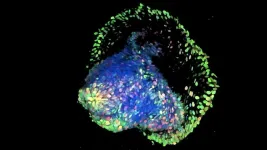(Press-News.org) Barcelona, Spain: Researchers have discovered key mutations in certain cancer cells that make them resistant to WRN inhibitors, a new class of anti-cancer drugs. The yet-to-be-published findings are presented on Friday at the 36th EORTC-NCI-AACR [1] Symposium on Molecular Targets and Cancer Therapeutics in Barcelona, Spain.
Werner helicase (WRN) inhibitors are already being evaluated in phase I clinical trials in patients with tumours that have microsatellite instability (MSI) – a condition in which the genes responsible for monitoring and repairing mistakes in DNA replication stop functioning, and errors are introduced. This is also called mismatch repair deficiency. MSI occurs in several cancers, including 20% of bowel and stomach cancers.
In 2019, a team at the Wellcome Sanger Institute, Cambridge, UK, led by Dr Mathew Garnett and including Dr Gabriele Picco as one of the first authors of the study, identified a protein in cancer cells, WRN, as being a vulnerability in MSI cancers. Since then, the team have shown that cancers resistant to standard-of-care therapies, including immunotherapy, rely heavily on WRN for survival.
Dr Gabriele Picco, senior staff scientist and project lead in Dr Garnett’s lab, told the Symposium: “WRN inhibitors function through a mechanism called synthetic lethality, where two non-lethal genetic events cause cell death when combined. MSI cancer cells, which have a defect in DNA repair, become dependent on WRN for survival. When WRN is inhibited, these cells cannot repair DNA damage, leading to their death, while healthy cells remain unaffected.”
The team identified the first WRN inhibitor effective against cancer cells in laboratory tests earlier this year, and shortly after, two additional inhibitors were reported, which are now in clinical trials for MSI cancers, including colorectal (bowel) cancer. However, MSI cancers can develop resistance to WRN inhibitors.
Dr Picco said: “Using advanced genetic screening and drug testing, our new study explores how colorectal cancer cells adapt to WRN inhibition and develop resistance, which is key for designing more effective therapies. After prolonged exposure to WRN inhibitors, we found that some cells acquired mutations in the WRN gene, the target of the drugs, rendering the drugs unable to bind and act on WRN effectively, allowing the cancer cells to survive.
“These mutations in the WRN gene highlight a novel resistance mechanism and provide a way for us to test the efficacy of alternative WRN inhibitors that might be able to overcome this resistance.”
Speaking before the Symposium, Dr Garnett said: “Our findings suggest that strategies that combine different drugs may be required to overcome resistance, including chemotherapy or immunotherapy. Moreover, approaches based on switching to alternative WRN inhibitors, including next-generation WRN inhibitors, might be also considered when resistance occurs. These results warrant further validation to advance clinical applications but have potential to inform clinical strategies and guide future treatment options.”
The findings might also enable clinicians to check how patients’ cancers are responding to a particular WRN inhibitor by means of liquid biopsies. These analyse patient blood samples to detect any cancer cells and DNA circulating in the blood stream.
“Tracking resistance mutations via liquid biopsy could be a potential strategy for monitoring treatment response,” said Dr Picco.
The team are now carrying out drug cross-resistance studies, which investigate whether MSI cancers that are resistant to one type of WRN inhibitor might also be resistant to others.
“We are exploring combination strategies and identifying alternative drug targets to address resistance,” he concluded.
Dr Tim Greten, senior investigator at the Center for Cancer Research, National Cancer Institute, USA, is co-chair of the EORTC-NCI-AACR Symposium and was not involved in the research. He commented: “The work that this group is carrying out into the mechanisms of WRN inhibitor resistance is an important step forward in this field. Although WRN inhibitors are a new class of anti-cancer drug, we are already seeing that cancer cells are able to develop resistance to them, enabling tumours to start growing again. Working out ways to prevent this from happening will be important in MSI cancers, which include some colorectal, stomach, endometrial and ovarian cancers.”
(ends)
Abstract no: 12, “On-target mutations drive resistance to WRN helicase inhibitors in microsatellite unstable colorectal cancer”, by Gabriele Picco, presented in plenary session 7, Late Breaking Abstracts and Proffered Papers: Novel discoveries in drug development. Friday 25 October, 15:00-18:30 hrs CEST, Rooms 111+112.
[1] EORTC [European Organisation for Research and Treatment of Cancer, NCI [National Cancer Institute], AACR [American Association for Cancer Research]. The Symposium takes place in Barcelona from 23-25 October 2024.
END
Researchers find key genetic mutations in bowel cancer cells that lead to resistance to WRN inhibitors
2024-10-24
ELSE PRESS RELEASES FROM THIS DATE:
Millions in the U.S. may rely on groundwater contaminated with PFAS for drinking water supplies
2024-10-24
PEMBROKE, N.H. — Approximately 71 to 95 million people in the Lower 48 states – more than 20% of the country’s population – may rely on groundwater that contains detectable concentrations of per- and polyfluoroalkyl substances, also known as PFAS, for their drinking water supplies. These findings are according to a U.S Geological Survey study published Oct. 24.
The predictive model results can help members of the public, water suppliers and regulators understand the potential for PFAS contamination, guide future studies and inform strategic planning for water resources.
USGS scientists are the first to ...
Human actions cause insect color change
2024-10-24
New Zealand’s native stoneflies have changed colour in response to human-driven environmental changes, new research shows.
Just published in the journal Science, the University of Otago study provides arguably the world’s most clear-cut case of animal evolution in response to change made by humans.
Co-author Professor Jon Waters, of the Department of Zoology, says the stonefly has become a different colour due to recent deforestation.
“In natural forested regions, a native species has evolved ‘warning’ colours that mimic those of a poisonous forest species, to trick predators into ...
New AI model could make power grids more reliable amid rising renewable energy use
2024-10-24
As renewable energy sources such as wind and solar become more widespread, managing the power grid has become increasingly complex. Researchers at the University of Virginia have developed an innovative solution: an artificial intelligence model that can address the uncertainties of renewable energy generation and electric vehicle demand, making power grids more reliable and efficient.
Multi-Fidelity Graph Neural Networks: A New AI Solution
The new model is based on multi-fidelity graph neural networks (GNNs), ...
Lurie Children’s helps train pediatricians to screen toddlers for mental health risk, with equity and ethics in mind
2024-10-24
One in five children has an identified mental health problem as early as age 3. Early detection is key to earlier intervention, and it also could prevent more severe conditions down the line, such as ADHD, depression and anxiety. Pediatric primary care is an ideal setting to conduct screening for mental health risk, given that pediatricians tend to have close, ongoing relationships with young patients and their families, and broad reach to historically marginalized communities. Since mental health screening of toddlers in primary care is uncommon, it is important to train pediatricians to do so without implicit bias and in a way that prevents unintended ...
UTEP researchers develop low-cost device that detects cancer in an hour
2024-10-24
EL PASO, Texas (Oct. 24, 2024) – Researchers at The University of Texas at El Paso have created a portable device that can detect colorectal and prostate cancer more cheaply and quickly than prevailing methods. The team believes the device may be especially helpful in developing countries, which experience higher cancer mortality rates due in part to barriers to medical diagnosis.
“Our new biochip device is low-cost — just a few dollars — and sensitive, which will make accurate disease diagnosis accessible to anyone, ...
Texas A&M physicist Kevin Kelly earns American Physical Society Early Career Award
2024-10-24
Dr. Kevin J. Kelly, an assistant professor in the Department of Physics and Astronomy at Texas A&M University and a member of the George P. and Cynthia Woods Mitchell Institute for Fundamental Physics and Astronomy, has been selected as the 2025 recipient of the American Physical Society’s Henry Primakoff Award for Early-Career Particle Physics in recognition of his contributions and promising career potential in fundamental particle physics and cosmology.
Kelly, who joined the Texas A&M faculty in 2022, works at the interface of two of the biggest outstanding mysteries in particle physics: ...
University of Maryland researcher awarded $1.8 million to study climate change’s impact on people with kidney disease
2024-10-24
Climate change is driving more extreme heat and more air pollution from wildfires, each of which put human health at risk. Now, new research funded by the federal Agency for Healthcare Research and Quality (AHRQ) and led by University of Maryland School of Public Health Professor Dr. Amir Sapkota, will study how these hazards independently and jointly impact already vulnerable groups, such as people living with end stage kidney disease (ESKD). The researchers aim to identify preventative solutions.
“During extreme heat, the damaged kidneys of people with ESKD do not regulate fluid levels very ...
Johns Hopkins Children’s Center research in mice suggests zinc supplements have potential value to directly treat short bowel syndrome
2024-10-24
Researchers from Johns Hopkins Children’s Center say they have identified a gene pathway involving the mineral zinc in mice that may someday point the way to using zinc-based supplements to directly help people with a rare disorder called short bowel syndrome (SBS).
The findings, published Oct. 7 in Nature Communications, help advance efforts toward more effective, potential treatment regimens for both children and adults with the debilitating condition.
SBS, which affects 10,000–20,000 adults and children in the United States, is marked by damage to and shortening of ...
Kalinin receives David Adler Lectureship Award
2024-10-24
Sergei Kalinin, a professor in the Department of Materials Science and Engineering, has been named the winner of the David Adler Lectureship Award in the Field of Materials Physics by the American Physical Society. The award recognizes one outstanding contributor in the field of materials physics who is notable for high-quality research, review articles, and lecturing.
“I am deeply honored to receive the Adler Award, as it recognizes the critical transition in materials discovery that my colleagues at the University of Tennessee and Pacific Northwest National Laboratory and I have championed,” ...
Evaluating the link between chemicals and declining insect populations
2024-10-24
Few people are fans of stink bugs, mosquitoes, or boll weevils, but insects play a key role in the circle of life that makes up the planet’s environment. In fact, world-renowned biologist E. O. Wilson famously declared that if insects vanished, our environment would collapse.
Scientists have noted that insect behaviour has been changing, and their populations are declining – on average 2-3% per year. This has prompted them to investigate the potential causes of this change, such as habitat loss due to overdevelopment, climate change, and chemical use.
EMBL researchers and collaborators recently investigated how pesticides, herbicides, ...






